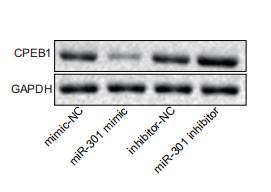CPEB1 Antibody - #DF2462
| Product: | CPEB1 Antibody |
| Catalog: | DF2462 |
| Description: | Rabbit polyclonal antibody to CPEB1 |
| Application: | WB IF/ICC |
| Reactivity: | Human, Mouse, Rat |
| Prediction: | Pig, Zebrafish, Horse, Sheep, Rabbit, Dog, Chicken, Xenopus |
| Mol.Wt.: | 63 kDa; 63kD(Calculated). |
| Uniprot: | Q9BZB8 |
| RRID: | AB_2839668 |
Related Downloads
Protocols
Product Info
*The optimal dilutions should be determined by the end user.
*Tips:
WB: For western blot detection of denatured protein samples. IHC: For immunohistochemical detection of paraffin sections (IHC-p) or frozen sections (IHC-f) of tissue samples. IF/ICC: For immunofluorescence detection of cell samples. ELISA(peptide): For ELISA detection of antigenic peptide.
Cite Format: Affinity Biosciences Cat# DF2462, RRID:AB_2839668.
Fold/Unfold
CEBP; CPE binding protein 1; CPE BP1; CPE-binding protein 1; CPE-BP1; CPEB 1; CPEB; CPEB-1; CPEB1; CPEB1 protein; CPEB1_HUMAN; Cytoplasmic polyadenylation binding protein 1; Cytoplasmic polyadenylation element binding protein; Cytoplasmic polyadenylation element binding protein 1; Cytoplasmic polyadenylation element-binding protein 1; FLJ13203; h CEBP; h-CEBP; hCPEB 1; hCPEB-1; MGC34136; MGC60106; mKIAA0940; MKIAA0940 protein;
Immunogens
Isoform 1 is expressed in immature oocytes, ovary, brain and heart. Isoform 2 is expressed in brain and heart. Isoform 3 and isoform 4 are expressed in brain. Expressed in breast tumors and several tumor cell lines.
- Q9BZB8 CPEB1_HUMAN:
- Protein BLAST With
- NCBI/
- ExPASy/
- Uniprot
MALSLEEEAGRIKDCWDNQEAPALSTCSNANIFRRINAILDNSLDFSRVCTTPINRGIHDHLPDFQDSEETVTSRMLFPTSAQESSRGLPDANDLCLGLQSLSLTGWDRPWSTQDSDSSAQSSTHSVLSMLHNPLGNVLGKPPLSFLPLDPLGSDLVDKFPAPSVRGSRLDTRPILDSRSSSPSDSDTSGFSSGSDHLSDLISSLRISPPLPFLSLSGGGPRDPLKMGVGSRMDQEQAALAAVTPSPTSASKRWPGASVWPSWDLLEAPKDPFSIEREARLHRQAAAVNEATCTWSGQLPPRNYKNPIYSCKVFLGGVPWDITEAGLVNTFRVFGSLSVEWPGKDGKHPRCPPKGNMPKGYVYLVFELEKSVRSLLQACSHDPLSPDGLSEYYFKMSSRRMRCKEVQVIPWVLADSNFVRSPSQRLDPSRTVFVGALHGMLNAEALAAILNDLFGGVVYAGIDTDKHKYPIGSGRVTFNNQRSYLKAVSAAFVEIKTTKFTKKVQIDPYLEDSLCHICSSQPGPFFCRDQVCFKYFCRSCWHWRHSMEGLRHHSPLMRNQKNRDSS
Predictions
Score>80(red) has high confidence and is suggested to be used for WB detection. *The prediction model is mainly based on the alignment of immunogen sequences, the results are for reference only, not as the basis of quality assurance.
High(score>80) Medium(80>score>50) Low(score<50) No confidence
PTMs - Q9BZB8 As Substrate
| Site | PTM Type | Enzyme | Source |
|---|---|---|---|
| K13 | Ubiquitination | Uniprot | |
| S43 | Phosphorylation | Uniprot | |
| T52 | Phosphorylation | Uniprot | |
| T80 | Phosphorylation | Uniprot | |
| T172 | Phosphorylation | Uniprot | |
| S178 | Phosphorylation | Uniprot | |
| S184 | Phosphorylation | Uniprot | |
| S208 | Phosphorylation | Uniprot | |
| K226 | Ubiquitination | Uniprot | |
| S231 | Phosphorylation | Uniprot | |
| K252 | Ubiquitination | Uniprot | |
| K305 | Ubiquitination | Uniprot | |
| K347 | Acetylation | Uniprot |
Research Backgrounds
Sequence-specific RNA-binding protein that regulates mRNA cytoplasmic polyadenylation and translation initiation during oocyte maturation, early development and at postsynapse sites of neurons. Binds to the cytoplasmic polyadenylation element (CPE), an uridine-rich sequence element (consensus sequence 5'-UUUUUAU-3') within the mRNA 3'-UTR. RNA binding results in a clear conformational change analogous to the Venus fly trap mechanism. In absence of phosphorylation and in association with TACC3 is also involved as a repressor of translation of CPE-containing mRNA; a repression that is relieved by phosphorylation or degradation (By similarity). Involved in the transport of CPE-containing mRNA to dendrites; those mRNAs may be transported to dendrites in a translationally dormant form and translationally activated at synapses (By similarity). Its interaction with APLP1 promotes local CPE-containing mRNA polyadenylation and translation activation (By similarity). Induces the assembly of stress granules in the absence of stress. Required for cell cycle progression, specifically for prophase entry.
Phosphorylated on serine/threonine residues by AURKA within positions 166 and 197. Phosphorylation and dephosphorylation on Thr-172 regulates cytoplasmic polyadenylation and translation of CPE-containing mRNAs. Phosphorylation on Thr-172 by AURKA and CAMK2A activates CPEB1. Phosphorylation on Thr-172 may be promoted by APLP1. Phosphorylation increases binding to RNA (By similarity).
Cytoplasm. Nucleus. Cytoplasm>P-body. Cytoplasmic granule. Cell junction>Synapse. Membrane. Cell junction>Synapse>Postsynaptic density. Cell projection>Dendrite.
Note: Continuously shuttling between nucleus and cytoplasm (PubMed:18923137). Also found in stress granules. Recruited to stress granules (SGs) upon arsenite treatment. In dendrites (By similarity). Localizes in synaptosomes at dendritic synapses of neurons (By similarity). Strongly enriched in postsynaptic density (PSD) fractions (By similarity). Transported into dendrites in a microtubule-dependent fashion and colocalizes in mRNA-containing particles with TACC3, dynein and kinesin (By similarity). Membrane-associated (By similarity). Colocalizes at excitatory synapses with members of the polyadenylation and translation complex factors (CPSF, APLP1, TACC3, AURKA, SYP, etc.) including CPE-containing RNAs (By similarity).
Isoform 1 is expressed in immature oocytes, ovary, brain and heart. Isoform 2 is expressed in brain and heart. Isoform 3 and isoform 4 are expressed in brain. Expressed in breast tumors and several tumor cell lines.
Interacts with kinesin, dynein, APLP1, APLP2, TENT2/GLD2 and APP. Both phosphorylated and non phosphorylated forms interact with APLP1 (By similarity). Interacts with TENT4B; the interaction is required for TENT4B-mediated translational control.
The 2 RRM domains and the C-terminal region mediate interaction with CPE-containing RNA (PubMed:24990967). The interdomain linker (411-429) acts as a hinge to fix the relative orientation of the 2 RRMs (PubMed:24990967). The ZZ domain (509-566) coordinates 2 Zn ions and is probably implicated in mediating interactions with other proteins in addition to increasing the affinity of the RRMs for the CPEs (PubMed:23500490, PubMed:24990967). A continuous hydrophobic interface is formed between the 2 RRMs (PubMed:24990967).
Belongs to the RRM CPEB family.
Research Fields
· Cellular Processes > Cell growth and death > Oocyte meiosis. (View pathway)
· Organismal Systems > Endocrine system > Progesterone-mediated oocyte maturation.
References
Application: WB Species: Human Sample: breast cancer cells
Restrictive clause
Affinity Biosciences tests all products strictly. Citations are provided as a resource for additional applications that have not been validated by Affinity Biosciences. Please choose the appropriate format for each application and consult Materials and Methods sections for additional details about the use of any product in these publications.
For Research Use Only.
Not for use in diagnostic or therapeutic procedures. Not for resale. Not for distribution without written consent. Affinity Biosciences will not be held responsible for patent infringement or other violations that may occur with the use of our products. Affinity Biosciences, Affinity Biosciences Logo and all other trademarks are the property of Affinity Biosciences LTD.

